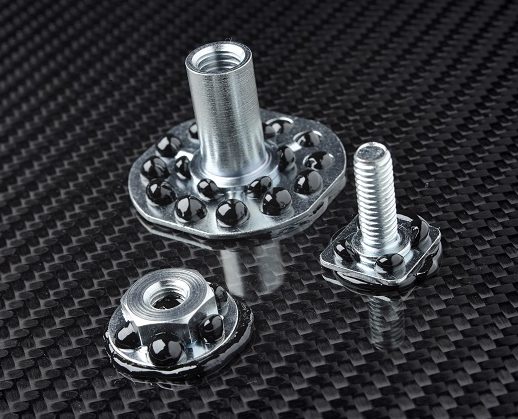

News & insight

Composite panel production for automotive applications: bigHead® Bonding Fasteners help provide fast, secure and precise results

The application of lightweighting composite materials for high-powered super cars and competition class cars with their inherent benefits in performance and form is well established. More recently the need to reduce CO2 emissions, improve fuel efficiency and counter the increased weight potential of comfort and added safety features has led many high-end luxury car manufacturers to utilise thinner and lighter composite materials – replacing traditional metals and plastics for body panels, exterior mouldings and structural fabrications.
As this trend develops, potentially towards mid-range vehicles, the automotive industry is facing the challenge to drive down the manufacturing costs of carbon fibre and other lightweighting material components and is working with its suppliers to develop new production and assembly procedures. As a fundamental part of this process, bigHead® the UK Company synonymous with the bonding fastener, has developed new assembly techniques to precision-fix bigHeads to its customer’s super thin products that can be flexibly and efficiently scaled from prototyping and small scale production all the way through to automated volume production.
Through the use of specialist dry adhesives in the form of pre-shaped tablets that ensure optimal dosage, bigHead fasteners can be securely and reliably bonded to CFRP panels with no special curing conditions required. The well-proven induction heating based process applies a moderate temperature, typically around 160 ⁰C, to the adhesive whilst the bigHead fastener is held securely in position – providing an immediate green strength bond and a typical 80% cure within five minutes. Bonding cycle times for robot-assisted automation with both adhesive tablets and bigHead fasteners introduced via an automated magazine storage and feeding system can be as little as 6 seconds whilst portable hand operated equipment offers up to 15 second overall cycle times. The process suits normal ambient shop floor temperatures without substrate pre-heating or abrasive preparation, for a clean bond without a carbon dust hazard. Tests on a threaded stud sample with a 48 x 48 mm head provided substrate rather than cohesive failure at pull-off values of 2300 N with torque resistance up to 25 Nm. Near full strength can be realised within 2 hours after bonding.
The results are completely invisible from the A-side of the panel with no shadowing or holes. The bigHeads’ perforated head design allows adhesive to flow through the holes and firmly lock the fastener with high load distribution and excellent stability, and also eliminates the mess associated with wet structural adhesives. The low profile bigHead also ensures that the panel is mounted very close to the frame, and with no need for panel thickening or reinforcement, panel form and structural design is not compromised in any way. The highly precise process can applied to all types of bigHeads which includes male studs, female collars and nuts, or pins in a choice of mild steel BZP or stainless steel 316. To further assist vehicle wiring and assembly, loops, hooks and tyraps or customised fixings can be also adapted for the process.
BigHead works with Tier 1 automotive suppliers to develop such processes on an engineer to engineer basis, ideally and most effectively from first ideas and concepts. In this way the optimal bigHead for the application can be designed with the fastener positioning and characteristics established to make the final production, quality and performance of each panel or structural component exactly as designed – and with completive and predictable costs.
Whilst this process was developed with the automotive industry in mind, smaller scale and specialist production in other application areas such as boat building, construction, and industry could also benefit where lightweighting is called for.
